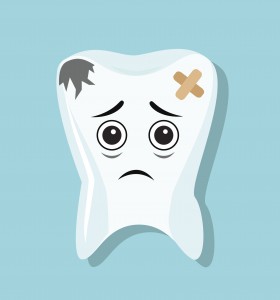I’m sure you’re all too familiar with the world cavity if you’ve been alive on this planet for some time. The word itself carries a negative weight so palpable, we’re sure you remember all the methods to prevent them from grade school. So, with all this emphasis we put on ridding our oral cavities of these suckers, so we actually know what they are? In this week’s blog, we’ll answer that question for you! Read on with us as we explore what exactly a cavity is, how they form, and why they’re so detrimental to your continued dental health.
Cavity Development
The reason we brush and floss everyday is to get rid of plaque. Plaque is a soft, sticky film that builds up on the teeth and contains millions of bacteria. It’s the bacteria within plaque that causes tooth decay. Enamel eventually starts to erode once decay begins, allowing cavities to develop easier. A cavity is a space inside a tooth that remains once tooth decay is removed. There are a number of different places where cavities usually form. To prevent cavities, you’ll need to limit the bacteria in your mouth, or keep it from building by actively brushing and flossing.
Where Do Cavities Form?
Cavities form in three main areas. Plaque build-up accumulates on the biting surfaces of teeth, between teeth, and on root surfaces. When plaque becomes trapped in the grooves and crevices of the teeth, and these areas aren’t brushed regularly, cavities will soon begin to form. Additionally, when plaque builds up between teeth, it is because these hard-to-reach surfaces cannot be reached by a toothbrush and are more susceptible to decay if you aren’t actively flossing. If you suffer from gum recession or bone loss, it’s more common to find decay on the exposed root surfaces of teeth. A cavity can quickly develop because roots do not have the same hard enamel covering as parts of the tooth that are supposed to be exposed. Now that you know all about cavities, how they develop, and where they form, you understand how important it is to schedule frequent cleanings. If you go to the dentist often, plaque does not have the opportunity to build up. A lack of plaque build-up means fewer bacteria which lead to cavity formation!
Call Catonsville Dental Care For Frequent Dental Cleanings
Catonsville Dental Care provides high-quality dental services to Catonsville, MD, and the surrounding areas. If you’re concerned about your gum health, or any other dental issues, we will be happy to provide you with the service and care that all of our patients have come to expect. We offer dental cleanings, implants, Invisalign, and other dental services as well as routine dental care and corrective treatments. With years of experience and countless testimonials, we’re your one-stop offices for all of your dental needs!
Book your appointment through our website today, or gives us a call today at410-747-1115 for your FREE consultation! You can also view the rest of our services and current specials HERE.

